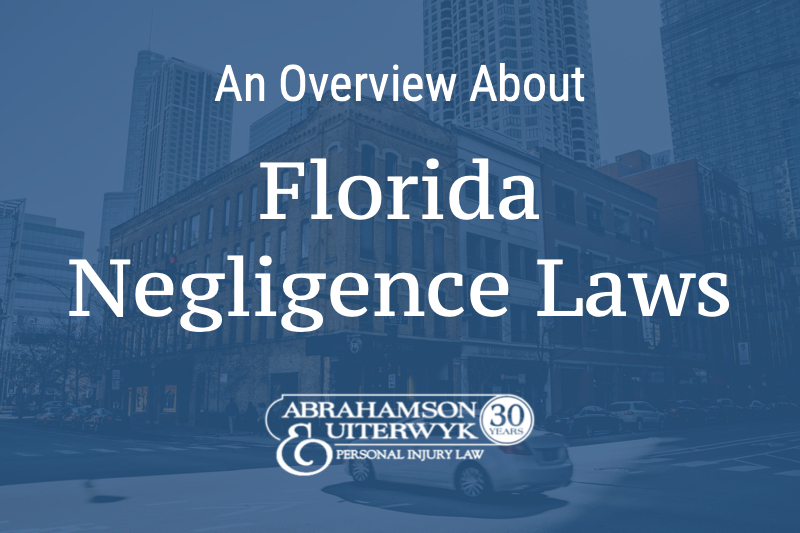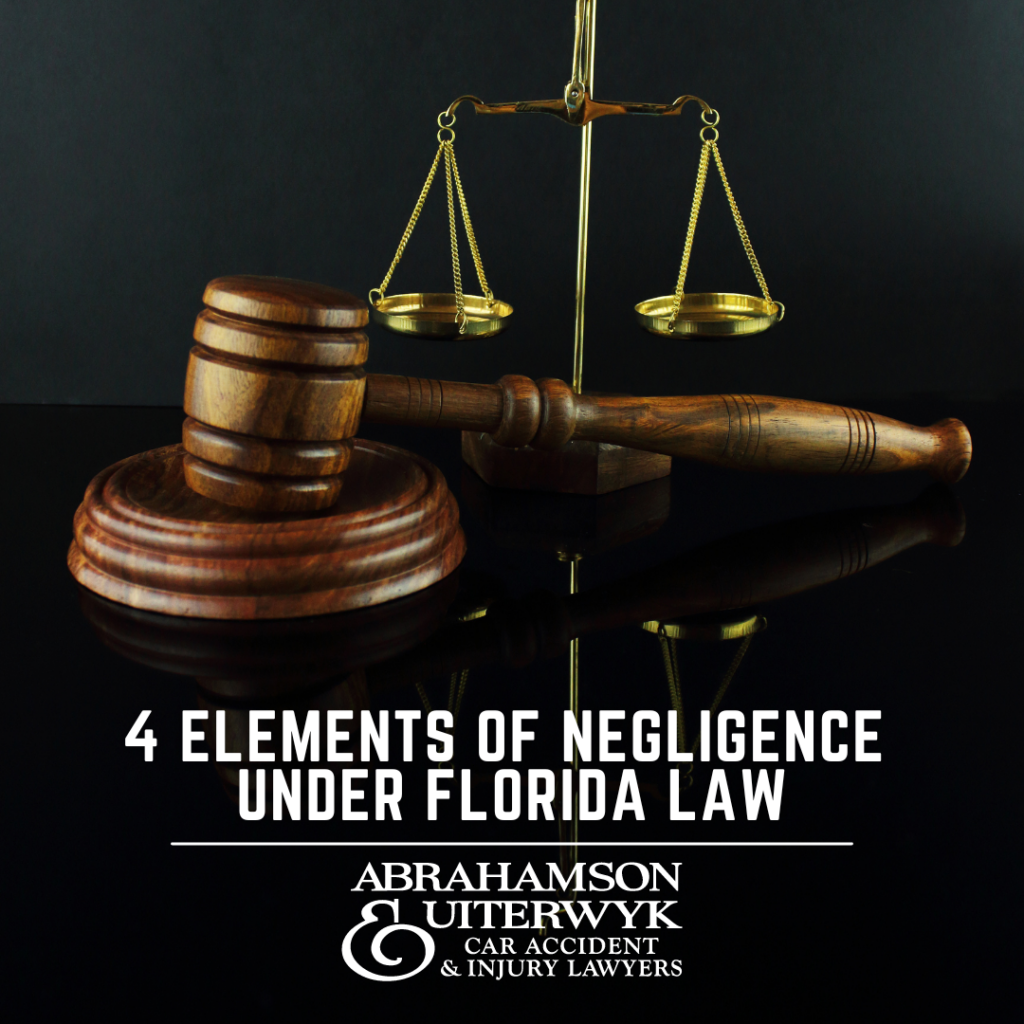Most people are familiar with the term personal injury law. However, this is just an umbrella term that covers a wide range of possible legal claims, from products liability to intentional torts, like assault.
But most personal injury cases are actually brought under the legal theory known as negligence, which has a long and storied history in American law. In this article, we will discuss the Florida negligence law, the 4 elements of negligence under Florida law, and how they may apply to your situation. For more information on Florida negligence statute, contact one of our experienced Florida personal injury lawyers near you for a free case evaluation at Abrahamson & Uiterwyk.
Florida and Comparative Fault
Florida is a modified comparative negligence state. Under modified comparative negligence, means that if you are found to be no more than 50% at fault for the accident, your recovery is reduced by the same proportion as your percentage of fault. For example, if you are found to be 20% at fault in an accident, you may still recover 80% of your damages in a lawsuit. If, however, your percentage of fault is found to be more than 50%, you are barred from any recovery under the law.

What is Florida Negligence Law?
You may be wondering, “What is Florida Negligence Law?” Florida’s negligence law, also known as Tort Law, holds people accountable when their actions or inactions cause harm to others. Negligence can consist of doing something that a reasonably cautious person would not do, like running a red light at an intersection, or failing to do something that a reasonable person would do under the circumstances, such as not cleaning up a spill on a floor thus creating a risk of harm to others.
Sometimes, both the defendant and the injured person can be negligent. An example might be a driver who turns left in front of another motorist who is speeding. If the speeding driver brings a lawsuit for injuries, a jury will determine the percentage of negligence chargeable to the defendant for violating the other driver’s right of way, as well as the percentage of comparative negligence attributable to the speeding driver. Under Florida’s Comparative Negligence Law, found at § 768.81 (2023) (section 768.81 of the Florida Statutes), if the injured person is found to be more than 50% responsible for the accident, he or she is barred from any recovery of damages. If, on the other hand, the injured person is found to be 50% or less responsible, his or her damages are reduced by that same percentage.
What is the Negligence Statute and What are the 4 Key Elements of Negligence in Florida?
In Florida, negligence is generally defined as the failure to exercise a reasonable degree of care expected to prevent harm to others. The four essential elements of negligence in Florida include: duty of care, breach of duty, causation, and damages. Here’s how each of these elements is broken down:

- Duty of Care. The first element requires showing that the person or entity who caused the injury owed a duty of care to the injured party. This duty refers to a legal obligation based on the relationship between the parties involved.
For instance, every driver has a duty to operate their vehicle safely and in compliance with traffic laws. Similarly, a business owner who opens their establishment to the public has an obligation to ensure that the premises are free from hazards that could harm customers. - Breach of Duty. The second element is proving that a breach of duty occurred. This breach establishes the legal foundation for a negligence claim. For example, a driver breaches their duty if they drive recklessly or violate traffic laws. Likewise, a store owner breaches their duty if they fail to clean up a spill, creating a hazardous situation for customers.
- Causation. Causation refers to demonstrating that the defendant’s actions directly caused the injuries or damages sustained. While this element might seem straightforward, it can become complicated in situations involving multiple parties or events.
For example, if one driver hits another and damages their vehicle, establishing causation is clear. However, in situations like a store accident, where an item falls off a shelf and injures a customer, causation may initially seem indirect. If the store owner positioned the item in a way that posed a danger to customers, the injured party could argue that the owner’s negligent actions were the legal cause of the harm. - Damages/Injury. The final element requires showing that the injured party suffered actual damages or losses that are compensable. This typically refers to financial losses, though it can also include other forms of harm. It is essential to prove that damages exist in order to pursue a claim. Understanding the difference between compensatory damages vs punitive damages can help clarify what types of losses may be recoverable in a negligence claim.
In Florida, damages are supported by evidence such as medical bills, proof of lost wages, property damage appraisals, and more. Additionally, less tangible losses, such as pain and suffering or loss of enjoyment of life, can also be claimed.
Florida’s negligence laws not only outline what constitutes a claim but also specify the types and amounts of damages a plaintiff may seek. If you have been injured due to the negligence of another part, whether in a car accident, slip and fall, or any other situation, you have the right to seek compensation. Reach out to us to schedule a free case review.
Injured By Someone’s Negligence in Florida? Call Abrahamson & Uiterwyk Today!
If you suffer injuries or other damages in an accident caused by someone else’s negligence, you have the right to seek compensation. And while filing any legal claim seems scary, the nearby personal injury team at Abrahamson & Uiterwyk is here to make the process as stress-free as possible.
We know the law and proudly boast 35 Years of experience successfully representing clients throughout Florida. We offer potential clients a free case evaluation to assess your claim and advise you on the best legal path for your recovery.
To schedule an appointment with us, call us at 813-223-5295 or contact us on our website.
Learn more about Florida Punitive Damages Cap.
See What Our Clients Have To Say
“Car accidents are probably one of the scariest and unexpecting times of our life. I received a referral from a friend for Abrahamson & Uiterwyk and I’m beyond glad I did. I called them while I was in the hospital and they walked me through the entire process along with my legal rights for care.
The legal team stood by me, checking in to see how I was doing until my case closed.
I could not have been more pleased with the professionalism and care that they showed during such a difficult time.
I would highly recommend Abrahamson and he would be the first call I make if I need someone again.”
Lorie S.
Rating 5/5 ⭐⭐⭐⭐⭐
See our 4.9 rating and read more of our 362 reviews on Google!
Resources:

What are the four elements of negligence in Florida law, and how do they apply to a negligent security case?
The 4 elements of negligence in Florida law are:
If you have suffered injuries in an accident resulting from the negligence of another person or entity, you have the right to seek compensation. Contact us to schedule your free case review.
When should I consult an attorney for a negligence claim in Florida, and what qualifications should I look for in an attorney?
You should consult an attorney for a negligence claim in Florida as soon as you believe you have a valid case. The sooner you seek legal counsel, the better chance you have of preserving crucial evidence and meeting any applicable deadlines.
When looking for an attorney to handle your negligence claim in Florida, here are some qualifications and factors to consider:
Consulting with an experienced Florida injury attorney is crucial to navigate the complexities of a negligence claim in Florida and maximize your chances of a successful outcome.
What steps should I take if I believe I have a valid negligence claim in Florida and want to pursue legal action?
If you believe you have a valid negligence claim in Florida and want to pursue legal action, here are the steps you should consider taking:
Seek Medical Attention
Preserve Evidence
Document the Incident
Report the Incident
Consult an Attorney
Gather Medical Records
Notify Relevant Parties
File a Lawsuit
Discovery Process
Negotiation or Trial
Stay Informed
Follow Legal Advice
Remember that every negligence case is unique, and the specific steps may vary depending on the circumstances. Consulting with an experienced personal injury attorney is crucial to navigating the legal system and ensuring that you take the appropriate actions to pursue your claim effectively.